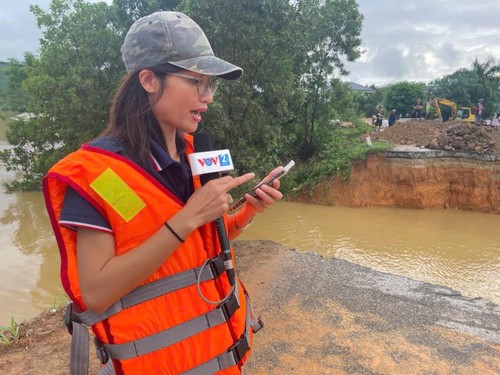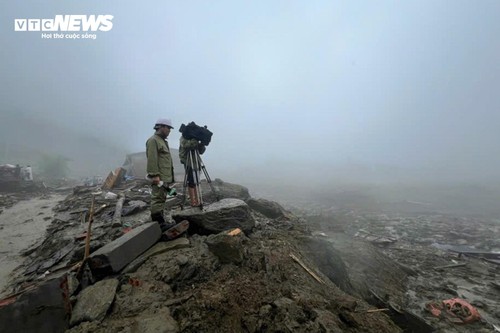 A VOV reporter covers recovery efforts in Tuyen Quang province. (Photo: vtcnews.vn) A VOV reporter covers recovery efforts in Tuyen Quang province. (Photo: vtcnews.vn) |
VOV’s reporters were deployed to key spots in Cao Bang, Bac Kan, Lang Son, Lao Cai, and Yen Bai province to provide updates on landslides, rescue efforts, and the evacuation of residents. They worked in extremely difficult conditions, sometimes with no electricity, communications, or clean water. They braved falling objects and the risk of being swept away by strong winds.
"What worried us most was having no way to contact the radio station due to interrupted communications. The five hours after the typhoon hit Quang Ninh province were the longest, most helpless hours of my life because I couldn’t communicate with my family or the radio station. I spent the morning interviewing, filming, and taking pictures. Then, around 10 AM, I went to a nearby office to send my reports to VOV’s headquarters," said Vu Mien, a VOV correspondent in the northeast region.
From Hanoi, VOV’s News and Current Affairs channel (VOV1) aired minute-by-minute updates. Its live broadcasts captured in real time the storm and flood response.
"The radio is very effective during natural disasters. In Thai Nguyen both electricity and water were cut off, yet with my phone in hand, I was able to provide updates on the storm response, particularly in isolated areas, on the radio," recalled Thai Nguyen province-based reporter Hoang Quang Huy.
 Dinh Hoan (VTC14 Channel) reports from Nu village, Bao Yen district, Lao Cai. (Photo: vtcnews.vn) Dinh Hoan (VTC14 Channel) reports from Nu village, Bao Yen district, Lao Cai. (Photo: vtcnews.vn) |
Reporters on the ground witnessed firsthand the pain and loss people in disaster areas endured.
"VTC14 had 10 teams working during typhoon Yagi and the subsequent flooding. When we heard about a flash flood in Lao Cai province, which wiped out an entire village and caused hundreds of casualties, we immediately went there. We were shocked to see the Nu village area completely devastated. There was nothing left. It was a truly painful sight," said Nguyen Dinh Hoan, a reporter from VTC Digital Television.
During typhoon Yagi, radio became the most reliable source of information, supporting people when there was no power, no internet, and flooding everywhere.
“When there was no power, we had to rely on the radio for information,” said a local.
"When there was no power and no phone signal, it was impossible to communicate with my family. So I listened to the radio every day to stay updated on the situation in Lao Cai, Yen Bai, and other areas," said another local resident.
During the typhoon, VOV’s broadcasts included frequent weather forecasts, warnings of unusual weather phenomena, and emergency directives about rain and flooding from the government. Tips on how to stay safe during the storm were shared with the public.
For ethnic minorities in remote areas like Long He, Thuan Chau district, Son La province, radio was a crucial source of information. A man named Vu A Thong said, "We listened to radio programs regularly. Especially during typhoon Yagi, the radio provided up-to-the-minute information so we could prepare and protect ourselves and our families."
At a Politburo meeting on September 9 to address the aftermath of typhoon Yagi, Party General Secretary and President To Lam praised the armed forces, weather forecasting agencies, the agricultural sector, and the media, including the Voice of Vietnam, for being proactive in mobilizing resources to prepare for the storm.
“VOV did an excellent job of guiding, updating storm information hourly, and disseminating information widely," he said.
The effort of VOV’s reporters played a key role in sustaining communications during the disaster, helping people minimize their risks and losses from the storm and subsequent flooding.